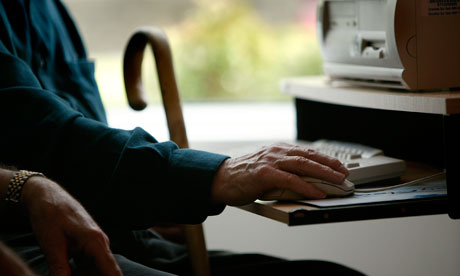Category Archives: Social care
Family Carers need the internet for support and friendship
Why it’s important to get older people and carers confident online
Rates of digital exclusion in social care are higher than in the general populationinShare0
-
Emma Solomon
- Guardian Professional,

The government’s digital by default agenda seeks to realise £1.8bn of savings by moving transactions with citizens online and it aims to boost the value of the economy by £63bn by developing better digital skills across the country.
Evidence suggests that being net savvy can save us time, money, make us feel better connected, less lonely and better informed. Conversely, being digitally excluded means having less (and diminishing) access to public and commercial services, to information and advice and to social interaction, all of which adversely impacts on wellbeing.
When depression affects 20% of older people living in the community and 40% living in elder care homes, compared with 10% of the population at large, and when national data shows that informal carers have lower levels of wellbeing than non-carers, being digitally literate is not just desirable, it becomes necessary.
Digital Unite research has shown that of those over 55s who are using the internet, four out of five (86%) said it had improved their lives, 72% said being online had helped reduce their feelings of isolation and 81% said using the internet makes them feel part of modern society. In addition, 20% of older learners in a Digital Unite social housing learning programme felt their understanding of health-related issues had improved as a result of being online.
Who will care for the disabled in years to come?
Who will care for the disabled in years to come?
Sunday 7 April 2013
By ANN MAXWELL
Published on Sunday 7 April 2013 00:00
WHO really cares about the future of our children and young adults who have profound learning disabilities as a consequence of severe epilepsy?
In Scotland, there are approximately 1,000 children and young adults under the age of 25 whose cognitive abilities are limited by the early onset of complex epilepsy in infancy. Most of these young people will have lifelong learning disabilities that will prevent them ever living independently, requiring round- the-clock care for the rest of their lives.
In childhood, naturally parents to want to care for their child with epilepsy. But as the complexities of the condition emerge and the damage of those early life seizures take their toll, parents begin to struggle. The family life they had hoped to enjoy as they raise their child (or children) slowly slips away from them.
New Training For Care Home Workers could be extended to health care assistants
Government Introduce New Training For Care Home Workers
UK- The Government has introduced plans to make training mandatory for care home staff in order to protect the elderly. Norman Lamb, the Health Minister, is proposing a minimum standard which all new recruits have to reach before they can start working in nursing homes. It is also planned that carers that look after pensioners in their own homes will have to undertake training too.






